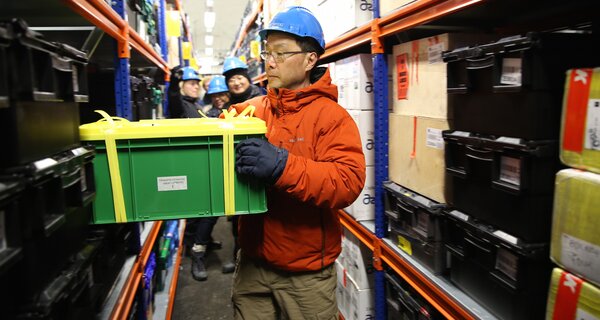Countries Facing Food Insecurity to Benefit From a USD 2 Million “Lifeline” for Crop Diversity
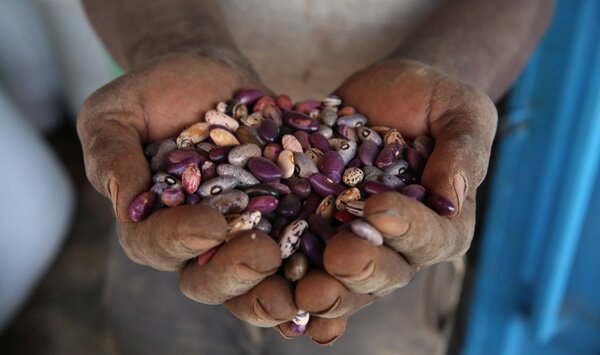 Countries across the globe are receiving new support for their efforts to protect the crop diversity they will need to stave off nutritional insecurity in the future. (Photo: L.M. Salazar/Crop Trust)
Countries across the globe are receiving new support for their efforts to protect the crop diversity they will need to stave off nutritional insecurity in the future. (Photo: L.M. Salazar/Crop Trust)As food supplies around the world are threatened by conflict, drought, and climate change, funding is being made available to bolster future food and nutrition security, by saving local varieties.
- The Crop Trust is supporting organizations in countries including Nigeria, Brazil, and Indonesia that protect the diversity of food crops and their wild relatives by helping them secure seeds in the Svalbard Global Seed Vault.
- Seeds to be safeguarded include major staples such as wheat and maize, as well as beans, sweetpotato, watermelon, and wild relatives of rice, finger millet and cowpea – diversity which we may need to cope with the changing climate.
- The initiative is part of the Biodiversity for Opportunities, Livelihoods and Development (BOLD) project, a 10-year effort funded by the Government of Norway and led by the Crop Trust.
BONN, Germany (13 October 2022) – As instability grips global food supplies in the wake of war, climate change, and rising prices, seed banks in countries across the globe are receiving new support for their efforts to protect the crop diversity they will need to stave off nutritional insecurity in the future. The grants will be a lifeline for the seeds needed to breed the nutritious, climate-resilient, high-yielding crop varieties of the future.
The Crop Trust is supporting seed collections in nearly 30 countries, managed by national genebanks, community seed banks, non-governmental organizations and universities, as part of the Biodiversity for Opportunities, Livelihoods and Development (BOLD) project, which the Government of Norway funds. The projects (amounting to more than USD 2 million so far) are the first tranche in a portfolio that is expected to reach up to USD 5 million.
Partners will use the money to multiply seeds ranging from major global staples such as wheat and maize to beans, sweetpotato, and the wild relatives of rice and cowpea. These seeds will be safeguarded in genebanks in the countries involved and backed up in the Svalbard Global Seed Vault, a vast subterranean arctic store – owned by Norway and managed in partnership between the Norwegian Ministry of Agriculture and Food, NordGen (The Nordic Genetic Resource Center), and the Crop Trust – that currently houses more than 1 million seed samples originating from almost every country.
The seeds being protected could hold key characteristics that make them better suited to changing climates, such as being able to withstand heat, drought, and new pests and diseases.
The danger facing seed collections and the importance of back-ups was recently demonstrated when an agricultural research station belonging to the Ukrainian national genebank system was damaged by Russian missiles, destroying seed samples. Ukraine’s seed collection is not backed-up in the Svalbard Global Seed Vault, with the exception of about 4%, which was secured through a collaboration with the Crop Trust in 2011.
The news of the BOLD funding follows recent support to the national genebank in Yemen from the Emergency Reserve for Genebanks, a collaboration between the Crop Trust and the International Plant Treaty.
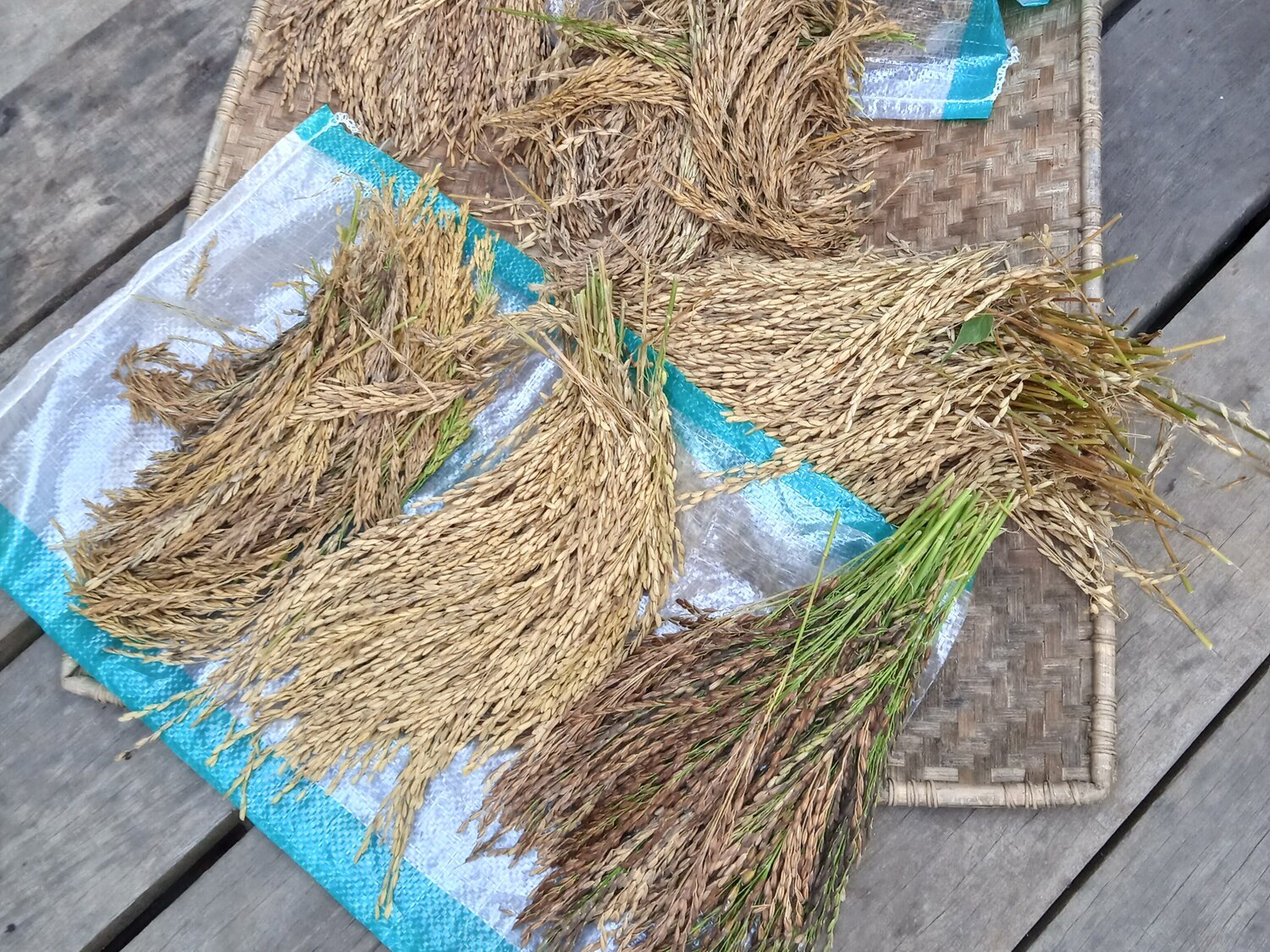
Indigenous rice varieties in preparation for the safety duplication in Svalbard. (Photo: Standy Christianto, The Borneo Institute, Indonesia)
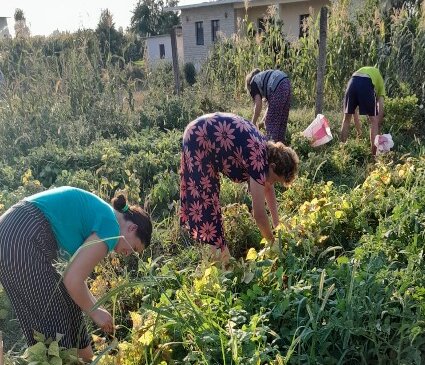
Harvesting regenerated bean samples at the field site of Agricultural University Tirana, Albania. (Photo: Ndoc Faslia)
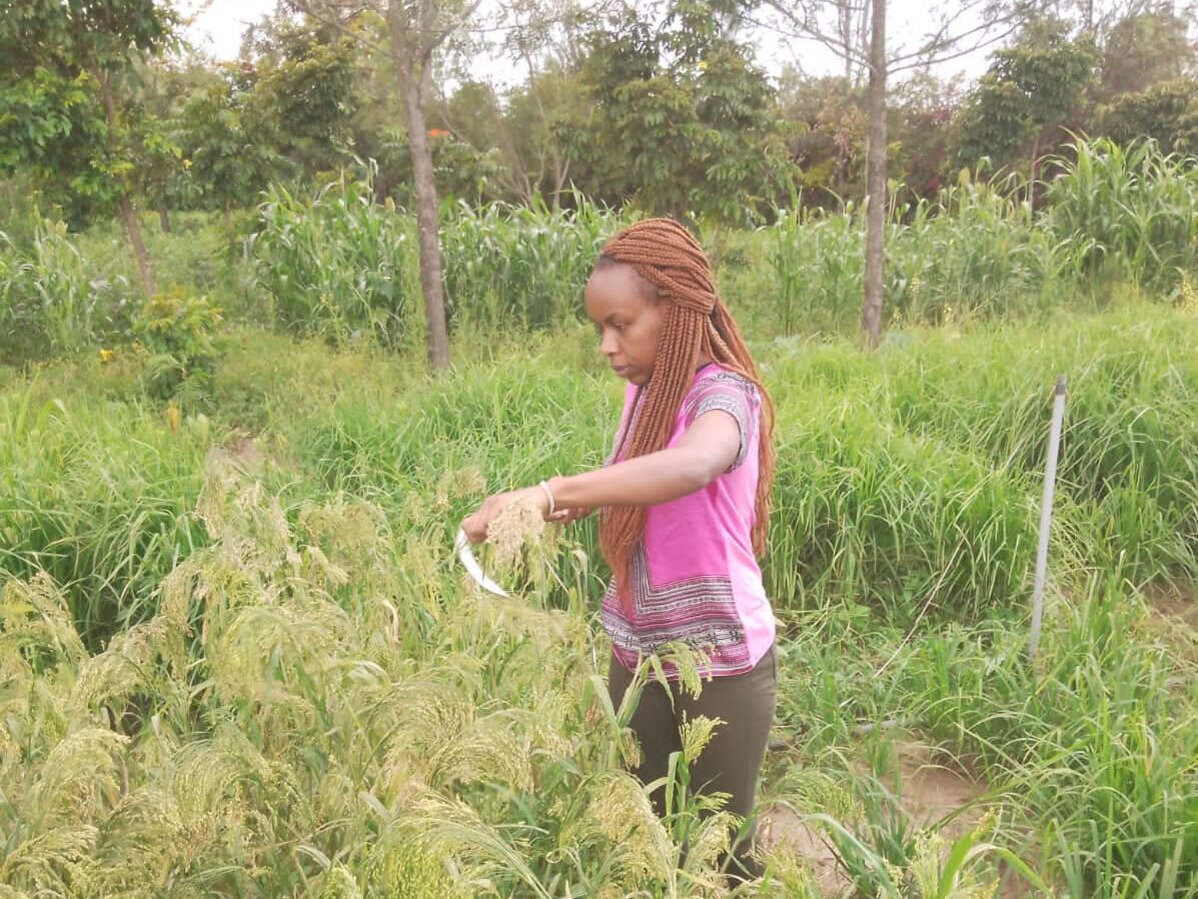
Harvesting millet at Seed Savers multiplication site, Nakuru region, Kenya. (Photo: Seed Savers Network Kenya)
Africa
According to the United Nations, about two-thirds of the grants are going to organizations in Africa, including four collections in Nigeria, where 19.5 million people are facing food insecurity. Seed-saving organizations there have received support to safeguard local varieties of okra, pumpkin, and local leafy vegetables.
Seed Savers Network (SSN) in Kenya, which received a grant of USD 73,623, is working with community seed banks across the country to help farmers restore lost crops and broaden the range of foods available to consumers.
By increasing diversity, SSN is improving the resilience of the local food system, which has evolved to meet the needs of an export market rather than local needs. By using crop varieties that are more nutritious, better able to withstand pests and diseases, and can thrive despite the changing climate, organizations such as SSN help increase food security long-term in Kenya.
"We thank the Crop Trust for working with SSN on this project because it is going to shine a spotlight on the importance of conserving food and agricultural genetic resources in Kenya,” says Seed Savers Network director Daniel Wanjama. “We intend to revive 1,000 local crop varieties at risk of extinction, and we shall also gain skills and knowledge from other stakeholders that will indefinitely increase our impact on the conservation of agrobiodiversity at the grassroots level."
In order to ensure they are not lost forever, seeds from the Indigenous Gwari people of Nigeria, including okra, cowpea, maize, and local varieties of tomatoes, peppers and melon, will be multiplied and safety duplicated as part of a USD 31,268 grant to Biodiversity Education and Resource Center.
Crop wild relatives are also being protected. The Institut d’Economie Rurale in Mali is receiving support to protect wheat, peanuts and rice, as well as the wild relatives of pearl millet and watermelon. Some crop wild relatives have evolved to survive particularly tough conditions, such as extreme heat, flooding, drought and poor soils. This means they can be a source of new genetic diversity – diversity that plant breeders can tap into to develop the new, more climate-resilient varieties so urgently needed by farmers around the world.
Asia
In Asia, The Borneo Institute, Indonesia has received funding to protect the crop diversity of the Dajak community, the Indigenous peoples of the island of Borneo. The diversity to be saved includes seeds of rice, eggplant (aubergine) and maize.
"The Borneo Institute wants to protect the seeds of today to safeguard the continuity of our history tomorrow,” says Managing Director of the Insitute Yanedi Jagau. “With this funding, we can combine hope and fight in a harmonious mix to enter the future, and this mix is called Dayak."
In Papua New Guinea, the PNG National Agricultural Research Institute (NARI) has received funding to protect the country's sweetpotato, a staple food crop, where it is uniquely diverse. Farmers may grow up to 5,000 different varieties of sweetpotato in PNG, but this diversity is declining as farmers switch from subsistence farming to commercial cropping. This grant will help safeguard over 790 seed samples, with back-ups sent to the Svalbard Global Seed Vault and the Centre for Pacific Crops and Trees (CePaCT), a regional genebank in Fiji.
"The grant is an excellent opportunity for NARI to grow out the national sweetpotato collection, take stock of what we have, and generate true seed for storage in the Svalbard Global Seed Vault,” says program director Birte Komolong. “This is a new approach for us to conserve the rich genetic diversity of sweetpotato and store it safely for future generations."
South America
In South America, two seed collections in Brazil have received funding, including USD 94,656.50 for Embrapa (the Brazilian Agricultural Research Corporation) to safeguard the diversity of beans, rice and maize.
Europe
The Institute of Plant Genetic Resources of Albania has received funding worth USD 100,510 to protect 850 samples of maize, watermelon, pumpkin, tomato, and cucumbers. The University of Sarajevo in Bosnia and Herzegovina (buckwheat, wheat, oats, rye, and flax) and the Civil Association FABIA CSB Bodganci in North Macedonia (basil, sunflower, chickpeas, and wheat) are also being supported.
“As food insecurity increases around the world and crop biodiversity continues to face dramatic decline, it is vital that traditional and local crop varieties are protected. Every seed sample conserved in a genebank represents a unique additional option available to breeders, researchers and farmers in the fight against climate change and food insecurity, and we cannot afford to lose any of them,” says Stefan Schmitz, Executive Director of the Crop Trust. “Many Indigenous communities and genebanks do not have the financial resources required to properly safeguard crop diversity and continue their vital work. That is why we’re so pleased to be able to provide this support today, to prevent the extinction of varieties that could one day hold the key to feeding the world’s population.”
Additional Quotes
Beri Bonglim, Technical Specialist at the Crop Trust, commented: “These are the first grants under this scheme, and we look forward to working with an additional 10 partners. We received more than 90 proposals from collection holders seeking support to regenerate and secure their crop diversity, and we are working through them as quickly as we can so we can provide timely support to as many of these heroes of crop conservation as possible.”
Benjamin Kilian, BOLD Project Coordinator at the Crop Trust, commented: “Securing these seeds is urgently needed so that they are available to everyone for future crop improvement and sustainable agricultural systems. If we want resilient agriculture, we need the diversity of seeds. This scheme is an incredibly important step towards this, and one of many ways the BOLD project is improving food and nutrition security worldwide.”
Notes to editor
Photos of seeds, the Svalbard Global Seed Vault and some crops are available here.
Glossary
Wild relatives: Crop wild relatives (CWR) are the cousins of our food crops that still grow in nature. Many have evolved to survive tough conditions, such as extreme heat, drought, flooding and poor soils. This means they can be a source of novel genetic diversity—diversity that plant breeders can tap to develop more resilient food crops.
About the Crop Trust
The Global Crop Diversity Trust, known as the Crop Trust, is an international organization working to conserve crop diversity and protect global food and nutrition security. At its heart is an endowment fund to provide guaranteed financial support to genebanks worldwide. It supports the Svalbard Global Seed Vault and coordinates large-scale projects worldwide to secure crop diversity and make it available for use. The Crop Trust is recognized as an essential component of the funding strategy of the International Treaty on Plant Genetic Resources for Food and Agriculture (International Plant Treaty).
Learn more at www.croptrust.org.
About the grant
In October 2021, the Crop Trust, in coordination with its partners at NordGen and the Norwegian Ministry of Food and Agriculture, as well as the International Treaty on Plant Genetic Resources for Food and Agriculture (International Plant Treaty), and with the generous support of the Government of Norway, launched a competitive grant scheme with up to USD 5 million available in funding to support the multiplication and backing up of crop diversity in genebanks and the Svalbard Global Seed Vault. More than 90 seed collections applied in an open call to crop collection holders in lower- and middle-income countries, including non-governmental organizations, community seed banks, Indigenous organizations and university collections. An expert panel evaluated all applications and about 40 of these are expected to receive support through the scheme.
About Biodiversity for Opportunities, Livelihoods and Development (BOLD)
Biodiversity for Opportunities, Livelihoods and Development (BOLD) is a 10-year project to strengthen food and nutrition security worldwide by supporting the conservation and use of crop diversity. Funded with USD 58 million from the Government of Norway and launched in 2021, it builds on the work and achievements of the decade-long Crop Wild Relatives Project (2011-2021).
Categories: For The Press, Press Releases



